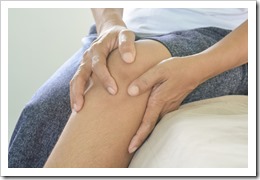Osteoarthritis of the knees can cause pain, stiffness, and diminished function. Conventional treatments include  non-steroidal anti-inflammatory drugs (NSAIDS) such as Ibuprofen, analgesics such as acetaminophen, corticosteroids, corticosteroid and non-steroid injections, muscle relaxant medications, opioid or narcotic medications, physical therapy and joint replacement.
non-steroidal anti-inflammatory drugs (NSAIDS) such as Ibuprofen, analgesics such as acetaminophen, corticosteroids, corticosteroid and non-steroid injections, muscle relaxant medications, opioid or narcotic medications, physical therapy and joint replacement.
Natural treatment interventions included diet and exercise plans, massage, hydrotherapy, acupuncture, physical therapy/manipulation, and several nutritional supplements (examples: SAME, Niacinamide, Fish oils) and botanical therapies (examples: curcuminoids, boswellia, devil’s claw, pine bark, ginger)
Some of the more recent positive research involves curcuminoids and/or boswellia. A meta-analysis published in March of 2018, was conducted on the short-term efficacy of curcuminoids and/or boswellia for symptoms of knee osteoarthritis. After searching several data bases for published research on randomized controlled trials of curcuminoid and/or boswellia products in patients with a diagnosis of knee osteoarthritis, outcomes were assessed for pain, knee function, use of rescue medications and adverse side effects.
A total of 92 potentially relevant studies were identified but only 14 met the inclusion criteria for this meta-analysis. A total of 1215 patients were studied in these 14 studies. In the end, 3 studies were eliminated in the analysis due to insufficient reporting on pain or function outcomes or used a comparison drug that is no longer available.
When curcuminoid products were compared to placebo, the effect of curcuminoid formulations on pain relief was significantly better. Function scores were significantly better too with the curcuminoids. There were no differences in rescue medications needed or patient reported side effects.
When boswellia formulations were compared to placebo, the effect of boswellia on pain relief and function scores were significantly better than placebo, and again, there were no significant differences in side effects between the herb and the placebo. The use of rescue medications was not adequately reported.
When curcuminoids were compared to NSAIDS, there were no differences between the two groups for pain scores, function scores, or the need for rescue medications. The patient withdrawal rate was lower for curcuminoid products than for ibuprofen.
Lastly, the combination products of boswellia and curcuminoid/turmeric formulations decreased pain with movement significantly better than placebo. Function scores were not well reported but the combination product did better than the NSAID celecoxib for pain relief. No serious adverse events were reported.
Commentary: From this meta-analysis, curcuminoid and boswellia formulations- administered alone or in combination, are significantly more effective than placebo in relieving symptoms of knee osteoarthritis and worked better than NSAIDS in some cases. In addition, they have an excellent safety profile. The next area of interest I would have is, are there some curcuminoid/turmeric products that achieve better results than others, based on the methodology used to enhance absorption of the curcuminoids. There are many turmeric/curcuminoid products on the marketplace claiming better absorption. And yes, absorption is one issue, which can be measured in a study, but absorption does not necessarily equate to better pain relief and improved function in the joints. Comparisons of these products in regards to symptom relief would be a desired study.
Reference: Bannuru R, Osani M, Al-Eid F, et al. Efficacy of curcumin and boswellia for knee osteoarthritis: Systematic review and meta-analysis. Semin Arthritis Rheum, published online March 10, 2018

